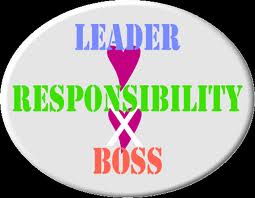
Accepting responsibility for actions and decisions is a very difficult process for most newly promoted leaders, in fact it can often remain an obstacle on the path to success for many leaders regardless of tenure. I’ve seen the effects of a leader’s inability to accept responsibility up close in a number of industries, I find that it is a particularly acute issue in emergency services.
Because most managers and supervisors rise through the ranks, once promoted, people who were friends are now subordinates. Most of those we supervise know us, our habits, our past including all of the mistakes we made on the way up and they are likely to throw our own mistakes in our faces when we call them out on theirs. It’s a tough place to be, so the tendency to protect ourselves and to maintain friendships often leads to blaming others or shirking the responsibility for our actions and decisions.
Common cop outs include “it’s management’s rule not mine”, “ sorry, it’s out of my hands”, “that’s what the Big Boss said”, “they left me no choice…”
Sorry…in my eyes those are ALL cop outs. Shifting the blame and the eyeballs off you in an effort to avoid assuming a leadership position or avoid working through unpopular policies, directives and other issues only serves to weaken your credibility.
When a policy is put in place that requires us to change, almost no one likes it, we are creatures of habit. In emergency services, we also have a lot of time between calls to look for reasons to complain.
If your organization has a solid leadership structure, you knew the policy was coming, in fact you probably sat in on the leadership team meeting(s) where implementation was discussed…99 times out of 100
you have not been surprised, don’t try to pretend otherwise.
Instead, take the time to explain the rationale behind the change, perhaps the options that were evaluated and the intended improvement that is expected…then stand up with the management team and support and enforce it.
If not, you will lose credibility and the trust of both staff and management. You will be seen by management as not being a strong member of the team and you’ll simultaneously be viewed as a wedge by the staff that they can exploit to undermine your fellow leadership team members…this will make for a very short career.
Another area that needs to be addressed here is the application of discipline. Leaders run the gamut from talking their staff to death and never taking disciplinary action to wielding the pen like a sword and cutting a swath through the ranks looking for any infraction. Neither choice a good one…everything in moderation…talk, teach, set boundaries, apply discipline as needed.
Those who talk their staff to death are looking for validation and being a leader that everybody likes. In fact, by not taking action and becoming known for fairness and consistency you will quickly be loved by those who want to challenge the rules and hated by those who recognize their importance…since you never make a decision…everyone will learn to just ignore and go around you rendering you useless and ultimately easily replaceable.
The flip side…the tyrant…newly promoted and out to prove who’s boss…hated universally by all, trusted by no one and unable to generate support, teamwork and if in the military, most likely to be killed by friendly fire.
After almost three decades in leadership positions in several types of organizations, I’m comfortable passing on some sage advice that was given to me…become known by your actions…make decisions, admit mistakes, be firm, fair and consistent and you’ll find support at all levels of the organization. You can’t be an effective leader if you are afraid to be out in front leading by example, make and admit your own mistakes and if you are always looking for the popular answer.




